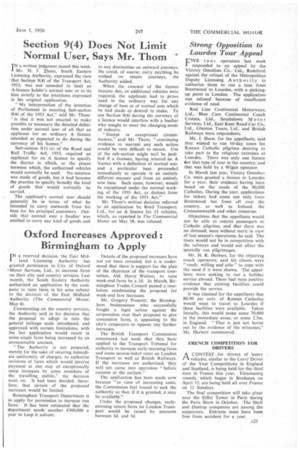Section 9(4) Does Not Limit Normal User, Says Mr. Thom
Page 75

If you've noticed an error in this article please click here to report it so we can fix it.
IN a written judgment issued this week. I Mr. H. J. Thom, South Eastern Licensing Authority, expressed the view that Section 9(4) of the Transport Act, 1953, was not intended to limit an A-licence holder's normal user or to tie him strictly to the intentions expressed in his original application.
" My interpretation of the intention of Parliament in enacting Sub-section 9(4) of the 1953 Act," said Mr. Thom is that it was not enacted to make possible or necessary the detailed definition under normal user of all that an applicant for an ordinary A licence intended or expected to do during the currency of his licence."
Sub-section 5(1) (c) of the Road and Rail Traffic Act. 1933, required an applicant for an A licence to specify the district in Which, or the places between which, the authorized vehicles would normally be used. No mention was made of goods, but it had become the practice to specify broadly the kind of goods that would nolanally be carried.
The applicant's normal user should generally be in terms of what he intended to carry outwards from his base for his principal customers. Outside that normal user a haulier was entitled to carry any kind of goods and to any destination on outward journeys. He could, of course, carry anything he wished on return journeys, the Authority added.
When the renewal of the licence became due, or additional vehicles were required, the applicant had to prove 'need in the ordinary way for any change of base or of normal user which he had made or desired to make. To use Section 9(4) during the currency of a licence would interfere with a haulier who sought to meet the changing nee& of industry.
"Except in exceptional circumstances," said Mr. Thom, "convincing evidence to warrant any such action would be very difficult to secure. Use of the sub-section might well be justified if a licensee, having secured an A licence with a definition of normal user and a particular base, proceeded immediately to operate in an entirely different manner and from an entirely, new base. Such cases, however, would be exceptional under the normal working of the 1933 Act, as distinct from the working of the 1953 Act."
Mr. Thom's written decision referred to an application by Reed Transport. Ltd., for an A licence for 12 vehicles, which, as reported in The Commercial Motor on May 18, was refused.




























































































































































































































































